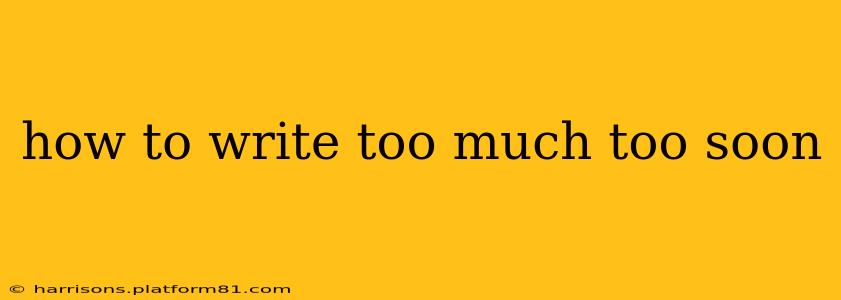How to Write Too Much, Too Soon: A Guide to Overcoming Writer's Block (and Other Pitfalls)
The phrase "too much, too soon" usually carries a negative connotation. But in the world of writing, especially for those battling writer's block or struggling with perfectionism, generating too much content too soon can be a surprisingly effective strategy. This isn't about sloppy, poorly-written work; it's about embracing a high-volume, low-pressure approach to unleash your creativity. This article explores how to harness this approach, addressing common concerns and offering practical advice.
What Does "Writing Too Much, Too Soon" Really Mean?
This approach isn't about cramming out pages of incoherent nonsense. Instead, it's about prioritizing quantity over quality in the initial stages of writing. Think of it as a brainstorming session, but with a pen and paper (or keyboard) instead of a whiteboard. The goal is to generate a large volume of raw material – ideas, sentences, paragraphs – without worrying about perfection. Editing and refining come later.
Why This Strategy Works
-
Overcomes Writer's Block: The pressure to write perfectly can be paralyzing. By focusing on sheer output, you bypass this pressure and allow your creativity to flow more freely. The act of writing itself often unlocks further ideas.
-
Uncovers Hidden Gems: Often, the best ideas don't emerge immediately. By generating a large quantity of text, you're more likely to stumble upon unexpected insights and stronger arguments.
-
Streamlines the Editing Process: Having a substantial amount of material makes editing much easier. You can focus on selecting the best sections, refining the language, and strengthening your arguments without the added pressure of generating content simultaneously.
-
Develops a Strong Foundation: A robust first draft provides a solid base for further development. It's easier to build upon an existing structure than to start from scratch.
How to Implement "Writing Too Much, Too Soon"
-
Set Time Limits: Allocate specific time blocks for writing. Even 15-30 minutes of focused writing can yield surprising results. The key is consistency.
-
Freewriting: Let your thoughts flow freely without stopping to edit or censor yourself. Don't worry about grammar, punctuation, or style. Just write!
-
Mind Mapping: Visualize your ideas using mind maps. This technique can help you uncover connections and explore different angles of your topic.
-
Embrace Imperfection: Remember, this is a draft. Don't aim for perfection at this stage. Focus on getting your ideas down on paper.
-
Batch Writing: Dedicate a specific period to intensive writing sessions. This approach helps to build momentum and sustain your creative flow.
How to Avoid Becoming Overwhelmed
-
Break Down Large Tasks: Divide your writing project into smaller, more manageable chunks. This makes the overall task less daunting.
-
Prioritize Regular Breaks: Avoid burnout by taking regular breaks to rest and recharge. Short breaks can enhance your focus and productivity.
-
Set Realistic Goals: Don't try to write too much in one sitting. Set achievable daily or weekly targets.
Is This Technique Right for Every Writer?
While this method can be immensely helpful for many writers, it's not a one-size-fits-all solution. Some writers may prefer a more methodical approach. Experiment to discover what works best for you.
Frequently Asked Questions (FAQs)
Q: What if I still struggle with writer's block even after trying this technique?
A: If the problem persists, consider exploring other techniques such as brainstorming with a partner, seeking feedback from a writing group, or working with a writing coach.
Q: How do I know when I've written "enough" before moving to the editing phase?
A: A good rule of thumb is to stop when you feel you've explored your topic thoroughly and exhausted your initial ideas. You may find that you have more than you need, which is excellent!
Q: What if I'm afraid of generating low-quality content?
A: Remember that this is a first draft. The purpose is to generate material, not to produce a polished piece. Low-quality initial work is expected; that's where the editing process comes in.
By embracing the "too much, too soon" approach, you can overcome writer's block, generate fresh ideas, and create a solid foundation for your writing projects. Remember, it's a journey, not a race.
